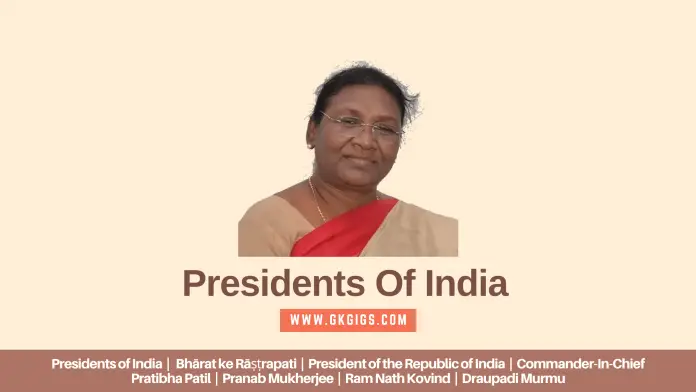
Last Updated: 14 July 2025
Before we get into the list of All Presidents of India, let us have a quick intro to the President of India.
The President of India (IAST: Bhārat ke Rāṣṭrapati), officially the President of the Republic of India, is the ceremonial head of state of India and the commander-in-chief of the Indian Armed Forces.
Mr. Ram Nath Kovind is the 14th and current President of the Republic of India who belongs to the Bharatiya Janata Party. He is serving as the President since 25 July 2017.
The Office of President was created when India became a republic on 26 January 1950, when its constitution came into force. The President is indirectly elected by an electoral college comprising both houses of the Parliament of India and the legislative assemblies of each of India’s states and territories, who themselves are all directly elected.
Page Contents
Eligibility
Article 58 of the constitution sets the principal qualifications one must meet to be eligible for the office of the President. A President must be:
- A citizen of India
- Must be 35 years of age or above
- Must be qualified to become a member of the Lok Sabha
A person shall not be eligible for election as President if he holds any office of profit under the Government of India or the Government of any State or any local or other authority subject to the control of any of the said Governments.
Certain office-holders, however, are permitted to stand as Presidential candidates. These are:
- The current Vice-President
- The Governor of any state
- A Minister of the Union or of any state (including Prime Minister and Chief Ministers)
If a Vice-President, a State Governor, or a Minister is elected President, they are considered to have vacated their previous office on the date they begin serving as President.
List Of All Presidents Of India
| No. | President | Term In | Term Out | Total Term | Party |
|---|---|---|---|---|---|
| 1 | Rajendra Prasad | 26 Jan 1950 | 13 May 1962 | 12 Years 107 Days | INC |
| 2 | Sarvepalli Radhakrishnan | 13 May 1962 | 13 May 1967 | 5 Years 0 Days | IND |
| 3 | Zakir Husain✝ | 13 May 1967 | 3 May 1969 | 1 Year 355 Days | IND |
| ~ | V. V. Giri | 03 May 1969 | 20 July 1969 | 78 Days | ~ |
| ~ | Mohammad Hidayatullah | 20 July 1969 | 24 Aug 1969 | 35 Days | ~ |
| 4 | V. V. Giri | 24 Aug 1969 | 24 Aug 1974 | 5 Years 0 Days | IND |
| 5 | Fakhruddin Ali Ahmed✝ | 24 Aug 1974 | 11 Feb 1977 | 2 Years 171 Days | INC |
| ~ | B. D. Jatti | 11 Feb 1977 | 25 July 1977 | 164 Days | ~ |
| 6 | Neelam Sanjiva Reddy | 25 July 1977 | 25 July 1982 | 5 Years 0 Days | JP |
| 7 | Zail Singh | 25 July 1982 | 25 July 1987 | 5 Years 0 Days | INC |
| 8 | Ramaswamy Venkataraman | 25 July 1987 | 25 July 1992 | 5 Years 0 Days | INC |
| 9 | Shankar Dayal Sharma | 25 July 1992 | 25 July 1997 | 5 Years 0 Days | INC |
| 10 | K. R. Narayanan | 25 July 1997 | 25 July 2002 | 5 Years 0 Day | INC |
| 11 | A. P. J. Abdul Kalam | 25 July 2002 | 25 July 2007 | 5 Years 0 Days | IND |
| 12 | Pratibha Patil | 25 July 2007 | 25 July 2012 | 5 Years 0 Days | INC |
| 13 | Pranab Mukherjee | 25 July 2012 | 25 July 2017 | 5 Years 0 Days | INC |
| 14 | Ram Nath Kovind | 25 July 2017 | 25 July 2022 | 5 Years 0 Days | BJP |
| 15 | Draupadi Murmu | 25 July 2022 | Incumbent | ~ | BJP |
| Acronyms 1) INC: Indian National Congress 2) IND: Independent 3) JP: Janata Party 4) BJP: Bharatiya Janata Party |
Facts About The President Of India
- The residence of the President of India:
- Primary: Rashtrapati Bhavan, New Delhi, Delhi, India
- Summer: The Retreat Building, Chharabra, Shimla, Himachal Pradesh, India
- Winter: Rashtrapati Nilayam, Bolarum, Secunderabad, Hyderabad, Telangana, India
- The salary of the President of India is ₹500,000 (US$6,600) (per month) and ₹6,000,000 (US$80,000) (annually).
- Under the Presidential and Vice-Presidential Elections Act of 1952, a candidate to be nominated for the office of President needs 50 electors as proposers and 50 electors as seconders for his name to appear on the ballot.
- A money bill can be introduced in the parliament only with the President’s recommendation.
- The President can declare war or conclude peace, on the advice of the Union Council of Ministers headed by the Prime Minister.
- The President is responsible for making a wide variety of appointments. These include:
- The Chief Justice and other Judges of the Supreme Court of India and State/Union Territory High Courts.
- The Chief Minister of the National Capital Territory of Delhi (Article 239 AA 5 of the constitution).
- The Comptroller and Auditor General.
- The Chief Election Commissioner and other Election Commissioners.
- The Chairman and other members of the Union Public Service Commission.
- The Attorney General.
- Ambassadors and High Commissioners to other countries (only through the list of names given by the prime minister).
- Officers of the All India Services (IAS, IPS, and IFoS), and other Central Civil Services in Group ‘A’.
- Although Article 53 of the Constitution of India states that the President can exercise his powers directly or by subordinate authority, with few exceptions, all of the executive powers vested in the President are, in practice, exercised by the prime minister (a subordinate authority) with the help of the Council of Ministers.
- All important treaties and contracts are made in the President’s name.
- As mentioned in Article 72 of the Indian constitution, the President is empowered with the powers to grant pardons in the following situations:
- Punishment is for an offense against Union law.
- Punishment is by a Military Court.
- A sentence that is of death.
- The President of India can declare three types of Emergencies: National, State, and Financial, under articles 352, 356 & 360 in addition to promulgating ordinances under article 123.
| Read More |
- List Of All Prime Ministers Of India With Photo (1947 to 2025)
- New Union Cabinet Ministers Of India List With PDF (2025)
- List Of Railway Minister Of India From 1947 To 2025
- Attorney General Of India (2025 List Updated)
- Presidents Of The United States Of America 2025 In Chronological Order












